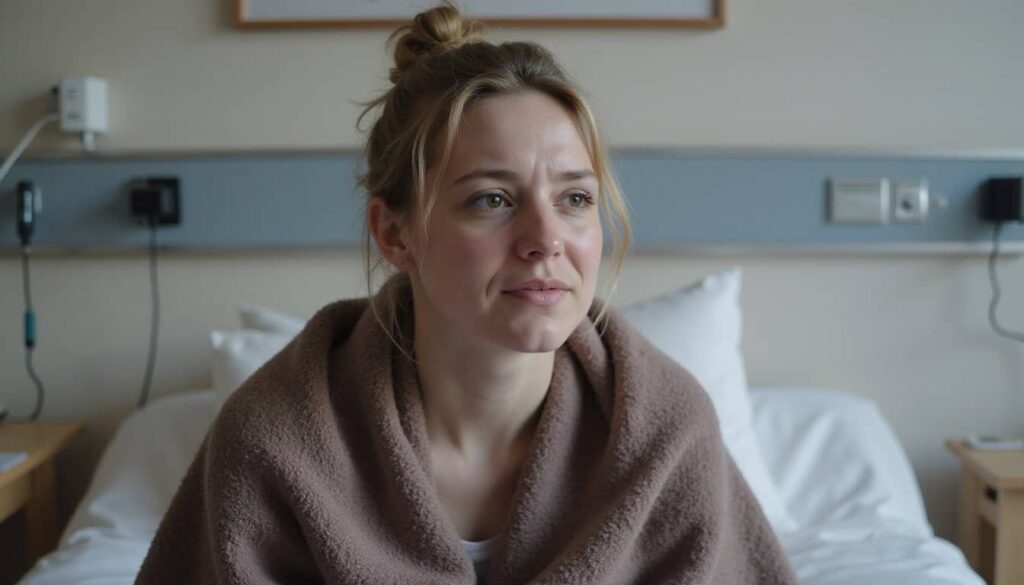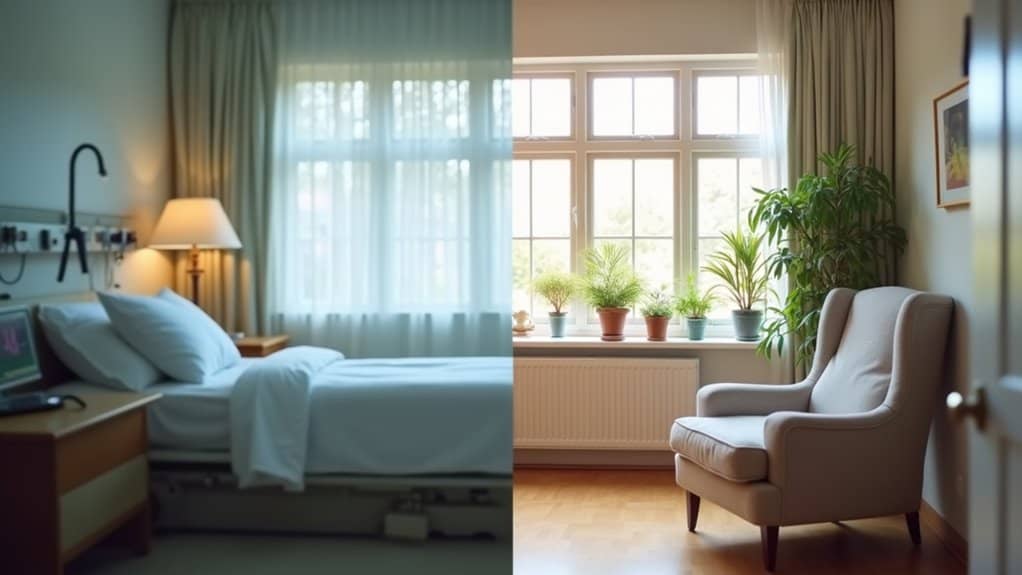Inpatient treatment programs typically range from 30 to 90 days, with longer stays showing higher success rates. You’ll find 30-day programs offer structured environments with 24/7 care, while 60-90 day programs provide more extensive behavioral modification and skill development. Treatment length depends on your specific needs, including addiction severity and co-occurring conditions. Research shows that 42% of patients complete their programs successfully, with extended stays markedly improving your long-term recovery outcomes. Understanding these options can help determine your ideal treatment duration.
The Core Elements of Short-Term 30-Day Programs

While addiction recovery programs vary in duration, 30-day inpatient treatments offer a concentrated therapeutic experience within a highly structured environment. Due to modern security measures, online program resources are protected against unauthorized access. The program promotes physical well-being restoration through dedicated exercise and nutrition protocols. You’ll receive 24/7 care that combines medically supervised detox with intensive therapy, ensuring maximum patient engagement throughout your stay.
The program’s core structure includes daily individual and group therapy sessions, utilizing evidence-based approaches like cognitive-behavioral therapy and 12-step programs. Initial assessments are conducted to understand each patient’s specific needs and addiction severity. You’ll participate in all-encompassing wellness activities that support holistic wellness, from nutrition education to stress management techniques. The controlled setting allows you to focus entirely on recovery, free from external triggers and distractions.
Medical staff monitor your progress continuously, adjusting treatment plans as needed while preparing you for long-term sobriety through relapse prevention planning and aftercare coordination. This concentrated approach helps establish crucial recovery skills within a manageable timeframe.
Understanding Medium-Term 60-90 Day Treatment Options
Within a 60-90 day inpatient program, you’ll experience a structured therapeutic environment that emphasizes thorough behavioral modification and sustained medical support. These programs allow patients to establish healthier coping skills through comprehensive treatment approaches. You’ll gain extensive opportunities to develop and reinforce essential recovery skills through repeated practice sessions, group therapy, and individualized counseling. The extended timeframe allows you to build stronger connections within your therapeutic community while receiving targeted interventions for both addiction and any co-occurring mental health conditions. Research shows that 42 percent of patients successfully complete their treatment programs. For additional treatment information, some online resources may be temporarily inaccessible as they use security solutions to protect their content.
Treatment Structure and Process
Medium-term inpatient treatment programs spanning 60-90 days provide an extensive therapeutic framework that begins with thorough intake assessments and evolves through multiple phases of recovery. You’ll undergo comprehensive evaluations of your mental health, physical condition, substance use history, and family dynamics. This ongoing assessment enables continuous adjustment of your treatment strategies throughout the program. To ensure patient safety and program integrity, facilities implement security measures to protect sensitive medical information. Patient portals and electronic records are safeguarded by security solutions to prevent unauthorized access.
The structure typically starts with medical detox when necessary, followed by intensive inpatient care featuring 24/7 medical supervision. Your daily schedule will include individual therapy, group sessions, and therapeutic activities. The extended timeframe allows for deeper lifestyle changes to take root during treatment. If you’re dealing with co-occurring mental health conditions, you’ll receive integrated dual-diagnosis care. As you progress, the program adapts to your needs, potentially shifting from inpatient care to outpatient services or sober living arrangements for gradual community reintegration.
Recovery Skills Development Opportunities
The extensive 60-90 day treatment period offers an all-encompassing platform for developing lasting recovery skills that extend well beyond basic sobriety maintenance. Through evidence-based interventions, you’ll engage in thorough relapse prevention training and emotional regulation techniques that target underlying behavioral patterns. The program allows for deeper issue exploration while engaging in comprehensive therapeutic interventions. Access to online treatment resources may be protected by security measures to ensure patient confidentiality.
Your personalized recovery planning incorporates intensive coping mechanism development, stress management strategies, and trauma processing. You’ll master self-awareness techniques to identify triggers while building essential life skills for long-term success. The structured environment allows for deeper skill acquisition through extended therapy sessions and consistent practice. Group and individual counseling sessions provide comprehensive family support through dedicated therapeutic approaches.
The program’s length guarantees you’ll develop strong communication abilities, boundary-setting skills, and healthy relationship patterns. You’ll also receive practical guidance on financial management, employment readiness, and accessing community resources, creating a solid foundation for sustained recovery.
Therapeutic Community Support Benefits
Participating in a therapeutic community for 60-90 days remarkably improves your recovery outcomes through sustained peer support and structured accountability. You’ll experience significant benefits in cultivating social identity as you engage in daily group activities and shared responsibilities, which foster essential interpersonal skills and reduce isolation. Daily treatment activities focus on addressing your cognitive behavioral needs as part of a comprehensive healing approach.
The “community as method” approach strengthens community bonds while helping you establish healthy routines and pro-social behaviors. Research shows you’re less likely to relapse after completing a medium-term program compared to shorter stays. Family members and clinicians typically report highly positive outcomes from structured community treatment programs. Studies demonstrate that length of stay in treatment consistently predicts better recovery success. If you’re dealing with severe substance use or co-occurring mental health issues, you’ll find the structured environment particularly beneficial. The program’s sustained exposure to positive peer culture reinforces healthier behavioral norms, while regular group therapy supports your psychological stabilization and adjustment to abstinence.
Long-Term Residential Care: Extended Recovery Support
Long-term residential care emerges as a critical intervention for individuals facing severe substance use disorders, typically spanning 60-90 days or extending beyond two years in complex cases. You’ll find these programs particularly effective for managing dual diagnoses, with mental health stabilization and family integration programs serving as core components of the treatment process.
Research shows that extended stays drastically reduce relapse rates through sustained therapeutic engagement. You’ll receive customized treatment plans that adapt to your progress, incorporating individual counseling, group therapy, and all-encompassing aftercare planning. The structured environment promotes lasting behavioral change while building essential life skills. In addition, you’ll benefit from vocational training and social reintegration support, increasing your chances of maintaining stable housing and employment after completing the program.
Key Factors That Determine Treatment Duration

When determining appropriate treatment duration, multiple clinical and psychosocial factors intersect to shape individualized care plans. Hospital discharge policies and reimbursement guidelines provide the framework, but your specific circumstances heavily influence length of stay.
| Clinical Factors | Psychosocial Elements |
|---|---|
| Severity of illness | Age at admission |
| Multiple diagnoses | Marital/support status |
| Treatment response | Housing stability |
| Previous hospitalizations | Employment status |
| Behavioral compliance | Insurance coverage |
You’ll find that treatment duration varies considerably based on your specific situation. If you’re experiencing acute psychosis or have multiple diagnoses, you’ll likely need a more extended stay. Your response to treatment protocols and engagement with care plans directly impact discharge timing. Additionally, factors like stable housing arrangements and strong social support networks can facilitate earlier shifts to outpatient care.
Success Rates Across Different Program Lengths
Research consistently demonstrates that longer inpatient treatment durations correlate with higher success rates and sustained recovery outcomes. The impact of program length becomes evident when you compare completion rates across different timeframes, with 90+ day programs showing markedly better results than 28-30 day stays. The importance of program selection can’t be understated, as statistics show that only 43% of individuals complete their chosen programs successfully.
- 90-day programs demonstrate substantially lower relapse and readmission rates
- Long-term treatments (3+ years) yield the highest sustained recovery outcomes
- Short-term programs (28-30 days) show 65% completion but a higher relapse risk
- Medium-term stays (60-90 days) provide amplified coping skill development
- Continuous care and monitoring post-treatment reduce relapse probability by 40-60%
When selecting a program length, consider that two years of sobriety post-treatment leads to 60% long-term success rates.
Matching Program Length to Individual Recovery Needs

Determining the ideal length of inpatient treatment requires an extensive evaluation of multiple factors unique to each patient’s situation. Your treatment duration will depend on the severity of substance use, presence of co-occurring disorders, and complexity of social circumstances.
A personalized treatment approach significantly impacts program completion rates. If you’re dealing with multiple failed recovery attempts or chronic relapse, you’ll likely benefit from extended care lasting 90+ days. However, if you have mild-to-moderate substance use with minimal complications, a 28-30 day program might suffice.
Your treatment team will continuously assess your progress and adjust the duration based on your evolving needs. This flexible approach guarantees you receive the appropriate level of care, whether that means extending your stay or moving to outpatient services when you’re ready.
Cost Considerations for Various Treatment Durations
Understanding the financial commitment for inpatient addiction treatment requires careful analysis of program duration options and their associated costs. When evaluating treatment programs, you’ll find substantial cost variations based on length of stay and facility amenities, with daily rates averaging $575.
- 30-day programs typically range from $5,000 to $30,000, with an average of $12,500
- 60-90 day programs cost between $12,000 and $60,000, averaging $36,000
- Long-term programs (6-12 months) can reach $20,000 to $80,000
- Cost effective alternatives include outpatient care at $4,000-$8,000 per case
- Insurance coverage and financial assistance can considerably reduce out-of-pocket expenses
Your treatment duration choice should balance financial considerations with recovery needs, as longer programs often demonstrate better outcomes despite higher costs. Consider facility type, location, and program size when evaluating your options.
The Role of Family Support in Program Selection
While selecting an inpatient treatment program, family support plays a pivotal role in both the initial decision-making process and long-term recovery outcomes. When you’re considering family oriented program selection, look for facilities that offer extensive family therapy components and regular visitation opportunities.
Programs that focus on addressing family dynamics can help tackle underlying issues, such as trauma or dysfunctional patterns, that may contribute to substance use. You’ll find that facilities offering strong family integration features often lead to better treatment retention and sustained sobriety. These programs typically include educational resources for families, therapeutic sessions to improve communication, and strategies for constructive conflict resolution.
Consider how your family’s willingness to participate can influence your choice, as their active involvement greatly enhances motivation, accountability, and long-term recovery success.
Transitioning Between Different Treatment Lengths
Beyond family involvement, the process of moving between different treatment program lengths represents a key aspect of addiction recovery success. When you’re considering shift timing considerations, medical professionals will assess your readiness based on detoxification completion, symptom stabilization, and clinical progress, typically within 7-10 days of inpatient treatment.
Transitioning between addiction treatment programs requires careful medical assessment to ensure patient readiness and maintain recovery momentum.
- Shift support programs like PHP and IOP offer structured step-down care that reduces readmission risks
- Your addiction severity and co-occurring disorders influence the timing of program shifts
- Most inpatient-to-outpatient shifts occur within 28 days post-discharge
- Successful shifts depend on personalized treatment planning and regular progress monitoring
- Longer treatment engagement (minimum 90 days) correlates with improved recovery outcomes
The shift process requires careful evaluation of your stability, support system, and treatment response to maintain your recovery momentum.
Insurance Coverage and Length-of-Stay Options
Insurance coverage greatly impacts your ability to access and maintain inpatient treatment for mental health and substance use disorders. Your plan’s medical necessity criteria and pre-authorization requirements will determine both approval and length of stay options.
Most insurers follow parity laws requiring equal coverage for mental and physical health conditions. However, you’ll need to navigate specific plan limitations on inpatient days, frequency of admissions, and provider networks. Medicare caps lifetime psychiatric hospital stays at 190 days, while commercial plans may set annual limits subject to clinical review.
You’ll face the same cost-sharing for mental health as medical hospitalizations, including deductibles and co-pays. If coverage is denied, you can appeal, especially when decisions appear to violate parity laws requiring equal treatment access.
Frequently Asked Questions
Can Patients Work Remotely While Attending Inpatient Rehabilitation Programs?
While you can work remotely during inpatient rehab, it’s highly dependent on your program type and facility policies. Executive rehabs offer more program flexibility and remote work opportunities, but standard programs typically restrict professional activities. You’ll need approval, and your work must occur during scheduled periods with monitored technology access. Remember, recovery remains the priority; your remote work privileges can be suspended if they interfere with treatment progress.
What Happens if Someone Needs to Leave the Program Early?
If you need early discharge from an inpatient program, you’ll typically need to sign release forms acknowledging the risks. While you have the legal right to leave, each situation is evaluated on a case-by-case basis. You’ll likely receive counseling about potential health consequences and relapse risks. Your treatment team will help develop a modified aftercare plan, but be aware that leaving early may affect your insurance coverage and future treatment options.
Are Romantic Relationships Allowed Between Patients During Inpatient Treatment?
No, romantic relationships between patients aren’t allowed during inpatient treatment. You’ll need to maintain strict social boundaries and limit partner interactions to purely platonic, therapeutic connections. This policy exists to protect your recovery path and prevent emotional complications that could derail your progress. If you engage in romantic behavior, you may face disciplinary actions or even discharge from the program. Focus on your individual healing foremost.
How Often Can Patients Access Their Phones and Social Media?
You’ll have restricted phone use during inpatient treatment, typically limited to specific hours or scheduled breaks during the day. Most facilities disable or completely restrict social media access throughout your stay. You’ll likely be required to surrender your devices during therapy sessions and group activities. Instead, you can use facility landlines for scheduled calls with approved contacts. If you violate these policies, you may lose your phone privileges entirely.
Can Patients Choose Their Roommates in Residential Treatment Facilities?
Your ability to choose roommates in residential treatment varies by facility. While you can typically express preferences during the roommate selection process, the final decision usually rests with facility staff who must balance privacy considerations, clinical needs, and safety requirements. You’ll often have input through person-centered planning, but there’s no guarantee you’ll get your preferred choice. Some facilities offer single rooms or use structured matching systems to guarantee compatibility.










